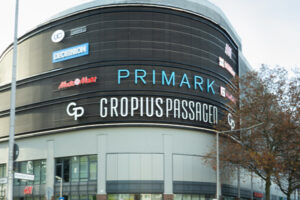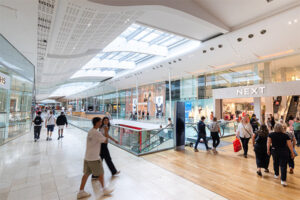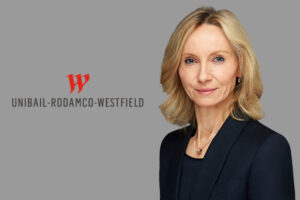Last year, we experienced a different and constantly changing pandemic landscape in the commercial real estate market. This required managers to react quickly and to be prepared for the ensuing recession and changes in consumer behavior. How did Multi Corporation approach these changes?
Retail, including the management of shopping centers, has always been a dynamic and competitive business. We knew this long before the pandemic, so for a long time we have been refining our comprehensive consumer analysis tools, all necessary to understand key changes, challenges, and emerging opportunities. In the current situation, three areas should be highlighted: (1) the trends that were shaping the industry landscape long before the pandemic, (2) those that are temporary and dependent upon administrative regulations in response to the pandemic, and (3) those that will shape consumer behavior in the upcoming years.
So, which consumer trends indicate opportunities for shopping centers?
For many years before the pandemic, we watched sales of mobile devices, smartphones and tablets around the world achieve record sales, and saw how this technology was becoming integrated in all aspects of our lives. Just to name a few examples: contactless payments, courier services, augmented reality, or virtual meetings. However, consumer behavior in the online world still differed significantly by industry. They were different for retail purchases, different for booking travel, tickets for sports events as well as for communication platforms. Additionally, we observed major differences by country, even the global standardisation of digital services required a highly nuanced approach in each geographic market. This was especially true for e-commerce, which was very diverse in each European country, particularly in terms of demographics. At the same time, of course, younger users across the continent were more likely to shop online.
And how has it changed in the last year or two?
More and more products, services, and social interactions are carried out online, while often in direct connection with the pandemic regulations. On the one hand, this has to some extent eliminated the differences in consumer behavior that we observed earlier, in the way e-commerce operates between national markets. On the other hand, research shows unequivocally that mental stress increases, and this cannot be dealt with by ‘ever more screens.’ Moreover, this phenomenon is growing fastest in people aged 18-29, the group that uses online solutions most intensively.
What are the consequences for shopping centers?
Well, it turns out that visiting them may be even more important than they were before the pandemic, and this is an opportunity to maintain their value in investors’ portfolios.
How?
Our analyses show that last year consumers were increasingly looking for “offline” alternatives to constantly being in front of their screen. Research indicates more than 64% of them see our malls as an attractive, qualitative alternative for spending time in, compared to the online world. We conclude from the experience of lockdowns that there is no substitute for live interpersonal relationships. For example, we have seen people rediscover the pleasure of being among others, or drinking coffee with friends in a pleasant open space outside the home. The social and psychological dimensions are of great importance here. Thus, the value of real estate assets appropriately positioned for these social and community needs will remain high and attractive for investors. At issue are leisure services, offering social, cultural and entertainment activities, and therefore a more mixed-use direction. Multi’s 40 years of experience across Europe shows that projects and facilities that have already undergone such a process of change have confirmed their attractiveness and social role after lockdowns. In addition, supplementing the commercial mix with health and beauty services or housing, significantly increases the resistance of such assets to lockdown or competition from online stores.
This is quite a surprising conclusion, because for over a year there has been a lot of talks about the fact that retail parks turned out to be the most resistant to the pandemic, and you say that the answer is mixed-use facilities?
It is true that smaller facilities performed best during the lockdowns. We are currently in the phase of recovering from the impact of the pandemic. We believe that the best results will again be achieved by the largest shopping malls with an area of 40,000 to 60,000 sq m footfall. In 2021, results were lower, by 5% to 12% compared to 2019, varying by month and according to the size of the facility and the prevailing regulations of course. However, turnover in most malls is now comparable, and in some cases even higher. All of the facilities we manage have returned to their previous growth paths. Consequently, we are convinced that shopping centers have very strong opportunities for future growth.
The customer has a big appetite for original and new products, solutions and experiences. Multi focuses on creating great visit and stay experiences. We are an active manager and dynamically introduce major upgrades, often to the structure of a shopping center itself; we create modern multi-functional areas not only as a platform connecting tenants with consumers, but also as a central part of the community. Our own team of architects, for instance, allows us to significantly reduce the time needed to implement changes in managed facilities, even when it comes to expansion or remodelling.
Do tenants share this optimism?
We have been noting for over a year now, that we believe the rebound in the leasing of both smaller and large retail brands will continue. We predicted that completely new tenant formats would appear on the European market. In Magnolia Park shopping center in Wrocław, managed by Multi, the brand of a particularly original cosmetics stores ‘Nectar Bath Treats’ has just debuted on the European continent. Currently, we are negotiating with ‘Nectar Bath Treats’ the lease of premises in other shopping centers managed by Multi in Poland. A characteristic element of its shops is the bright decor. Their stores look like colorful confectionery. For such innovative concepts, it is important to be able to prepare and offer locations that meet their special preferences.
These cases are often achieved with a change of layout. This was facilitated with Carrefour in Magnolia Park, with the redevelopment of 11,000 sq m to create more premises. Today’s manager of a shopping center, to meet the expectations of retailers, must have such redevelopment and leasing competences in the heart of the team.
Another phenomenon is the significant increase of the importance of short-term and special leases. At Multi, we strongly focus on professional services for this category of tenants. With Multi, you can rent a place for an event, or a promotional campaign, in the most crowded malls for hours, and a kiosk in the passage -for a period of less than a month.
Was this year successful in terms of leasing?
We already have a strong and established position, on both, the regional market and in Europe, and as recent lease agreements demonstrate, also globally. This is supported by excellent brand awareness and our partners seeing the development potential of their businesses at the shopping centers we manage. In the last months, we have leased nearly 64,000 sq m of gross leasable area in our six shopping centers in Poland. The largest deals signed in recent months, include: a Primark store, two Carrefour hypermarkets, Action and several HalfPrice stores, as well as the second LG Brand Store in Europe and a dozen of other brands. We are currently negotiating with other international chains as well as with innovative concepts interested in renting premises in Poland.






